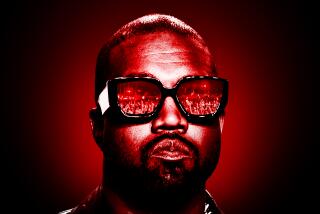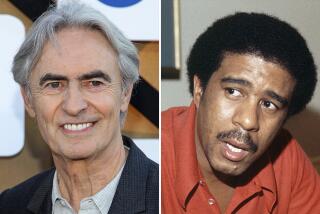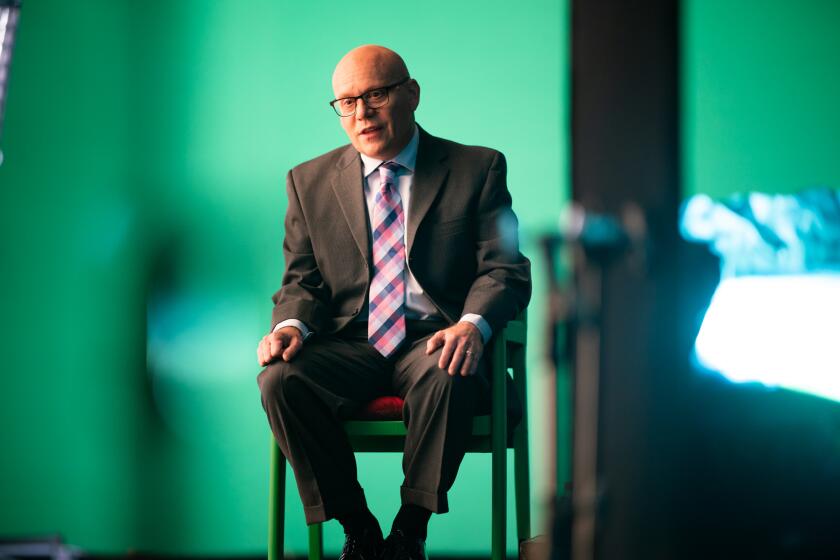The Aftermath of Public Enemy’s Collapse : Group blamed for harboring racist member
One of the most highly-charged elements of “Do the Right Thing,” Spike Lee’s controversial film about race relations in America, is the song that is heard repeatedly in the movie: Public Enemy’s “Fight the Power.”
A tense rap about blacks taking control of their communities, the piece includes the lines:
Elvis was a hero to most, but he never meant (expletive) to me
You see straight out racist the sucker was simple and plain
(expletive), him and John Wayne,
‘Cause I’m black and I’m proud, I’m ready, I’m hyped for some amp,
Most of my heroes don’t appear on no stamps,
Sample a look and you’re looking at nothing but rednecks for 400 years if you check.”
While Lee has been caught in a cross-fire of debate about whether his film is visionary or incendiary, Public Enemy itself has been involved in an even more heated, if lower-profile, controversy that has resulted in the disintegration of the group (at least temporarily).
While the furor didn’t stem from the words in “Fight the Power,” it did spring from the extreme views and politics of the rap group.
In an interview published May 22 in the Life section of the Washington Times, Prof. Griff (ne Richard Griffin), Public Enemy’s “minister of information,” said: “The Jews are wicked. We can prove that.” He added that the “majority” of Jews are behind “the majority of the wickedness that goes on across the globe.”
Though Griff didn’t play a prominent role on Public Enemy’s records, he appeared on stage with the group, “directing” a small cadre of uniformed “security” guards who carried replicas of the Uzi automatic rifle. He had previously been censured by group leader and main spokesman Chuck D (real name: Chuck Ridenhour) for anti-Semitic statements in interviews, but had been allowed to continue in the unit.
The anti-Semitic statements published in the Washington Times were quoted three weeks later in an essay that in New York City’s Village Voice. In his piece titled “The Enemy Within,” pop music writer R. J. Smith--a long-time supporter of Public Enemy--condemned not only Griff’s remarks, but also Chuck D’s failure to immediately disavow them. Smith’s story set off a protest in New York and triggered many pop music writers to re-examine the New York-based rap group.
Within days, the militant Jewish Defense Organization in New York began distributing leaflets denouncing Public Enemy and picketing screenings of “Do the Right Thing,” urging a boycott of the film because of its use of the song.
An apologetic Chuck D soon afterwards announced that Griff had been kicked out of the group. The group’s label, Def Jam, and management company, Rush Artists Management, then released a statement that Public Enemy was “disbanding for an indefinite period of time.” Chuck D has since been unavailable to the press, reportedly trying to sort out his future plans.
Meanwhile, neither Columbia Records, which distributes Public Enemy’s albums for Def Jam, nor MTV, the rock music cable TV channel, has backed away from the outfit. Columbia last week released a concert video of the group to stores, and MTV is airing a promotional video of “Fight the Power.” An MTV spokeswoman said the channel has received no viewer protests about the video.
But the JDO, which has approximately 3,000 members in seven chapters in the United States, last week mailed letters to record industry executives threatening, according to JDO spokesman Leonard Fineberg, to “break in half” anyone who continues to do business with Public Enemy.
Though Chuck D’s silence has removed the group members at least temporarily from the dialogue, rock critics and the group’s management company continue to reflect on the implications of the Public Enemy saga.
Critics have generally been supportive of Public Enemy throughout the group’s controversy-plagued three-year recording history--despite danger signs in its 1987 and 1988 albums that may, in retrospect, have signaled future anti-Semitic complaints. The group’s 1988 album, “It Takes a Nation of Millions to Hold Us Back,” was even named the best album of year by the more than 200 music writers from around the country who vote in the Village Voice’s annual critics’ poll.
In both albums there were words of praise for Nation of Islam leader Louis Farrakhan, a black separatist who has gained particular notoriety for terming Judaism a “gutter religion.”
In “Bring the Noise,” a song on “Nation,” Public Enemy proclaimed, “Farrakhan’s a prophet and I think you ought to listen to what he can say to you, what you ought to do.”
Village Voice writer Smith, who is white, noted in an interview with Calendar that numerous critics questioned Public Enemy last year about its social and political views after that endorsement.
But the critics, he said, generally accepted the explanation that the rap unit did not embrace Farrakhan’s anti-Semitic leanings, but did support other elements of his philosophy, such as economic independence for the black community. And ultimately, he added, many critics defended Public Enemy by saying that even if some elements of the group’s beliefs might be objectionable, they were accurate and powerful reflections of the reality of the black community.
While he still supports the rappers, Smith--and other critics interviewed by Calendar--still feel uneasy about the events of recent weeks.
“It would be a happier world if you could rationalize everything,” Smith said. “It doesn’t mean that their album isn’t the greatest album I can think of in the last couple of years. But it makes it harder to listen to.”
Veteran critic Dave Marsh, who delves into the political and cultural implications of pop music in his Rock and Roll Confidential quarterly, sees a contradiction in the reaction to Griff’s comments.
Referring to a late-’70s incident in which Elvis Costello made racial remarks about Ray Charles (and was decked by singer Bonnie Bramlett for them), Marsh said, “I think we all went too easy on Elvis Costello and too hard on Public Enemy. Chuck D said he was sorry and acted contrite. . . . but people are still seeking justifications for being punitive against him. . . .
“The reference to Farrakhan is not ipso facto , in any way, anti-Semitic. That’s like saying referring to Germany is anti-Semitic. . . . But almost everybody who’s written at any length about Public Enemy has had to stick their hands into the Farrakhan tar baby.”
Nelson George, who for 10 years covered black music for Billboard magazine until leaving recently, also feels that critics went too hard on Public Enemy and doesn’t believe the recent developments should be any cause for revising opinions.
“There’s no question they say Farrakhan’s a prophet,” George said. “But Chuck D was very specific about what they like about Farrakhan. That Prof. Griff is a (jerk) doesn’t invalidate the record. And Public Enemy was signed by Rick Rubin, who is Jewish, and one of their first managers is Jewish, as is the photographer that shot most of their album cover pictures, and (so is) their publicist Bill Adler.”
Adler, a publicist for Rush Artists Management, the company that manages Public Enemy and such other rap acts as Run-DMC and LL Cool J, sees a difference between Public Enemy’s music and Griff’s statements in the interview.
“Nothing in the philosophy of any band members that might be objectionable was on the records,” he said by phone from his office in New York. “There’s not much to argue with about the notion of black economic independence.”
Still, Adler, who describes himself as a “non-observant Jew,” has found the situation personally exasperating.
“It’s been very difficult for me,” he said. “I have people from the JDO calling me a self-hating Jew. I’m enough of a Jew that it hurts, or at least makes me reflect, but I’ve been able to separate out the issue of anti-Semitism because it’s embodied only by Griff, and I’d long since separated him from the group in my mind.”
But the JDO isn’t backing off from its stance, criticizing the critics for not completely condemning Public Enemy.
“The ones who are Jewish are the biggest cowards,” Fineberg said. “I think they’re afraid of creating a black backlash.”
And now the organization is focusing its rage on record producer Rubin, even though he is no longer associated with Public Enemy. Fineberg is calling for a record industry boycott of the producer, who now lives in Los Angeles and runs Def American Records.
“We blame Rick Rubin,” Fineberg said, calling the producer “self-hating Jewish trash. He is a child. The only thing that will educate him is to ruin his career. He could have put a crimp on (Public Enemy) in the first place. We’re going to punish him for his lack of morality through strong but legal and effective means.”
A spokesman for Def American said Rubin “is not commenting on threats made by the reactionary JDO.”
Meanwhile, R.J. Smith, the Voice writer, believes the group has no one to blame but itself for the problems.
“I think Public Enemy brought on themselves all the hostility and rage and bad feelings and demonstrations,” he said.
More to Read
Only good movies
Get the Indie Focus newsletter, Mark Olsen's weekly guide to the world of cinema.
You may occasionally receive promotional content from the Los Angeles Times.










